Future Generation Computer Systems ( IF 6.2 ) Pub Date : 2022-11-18 , DOI: 10.1016/j.future.2022.11.007 Issam W. Damaj , Hadi Al-Mubasher , Mahmoud Saadeh

|
The increased need for data, combined with the emergence of powerful Internet of Things (IoT) devices, has resulted in major security concerns. The decision-making related to choosing an adequate cryptographic algorithm to use is, indeed, an example concern that affects the performance of an implementation. Lightweight or tiny ciphers are considered to be the go-to algorithms when talking about embedded systems and IoT devices. Such ciphers, when properly integrated, are expected to have a minimal effect on the overall device utilization and thus provide effective performance. In this paper, we propose a unified analytical framework for lightweight ciphers as implemented within heterogeneous computing environments. This framework considers a carefully identified set of metrics that can adequately enable the capturing, ranking, and classifying the attained performance. To that end, a designer can make effective evaluations and exact adjustments to an implementation. This framework uses three decision-making approaches, namely the Technique for Order of Preference by Similarity to Ideal Solution (TOPSIS), Preference Ranking Organization Method for Enrichment Evaluation (PROMETHEE) II, and Fuzzy TOPSIS. Such approaches take into account both hardware and software metrics when deciding on a suitable cryptographic algorithm to adopt. Validation entails a thorough examination and evaluation of several performance classification schemes. The results confirm that the framework is both valid and effective.
中文翻译:

用于轻型密码算法异构实现的扩展分析框架
对数据的需求增加,加上功能强大的物联网 (IoT) 设备的出现,导致了重大的安全问题。与选择合适的加密算法相关的决策确实是影响实现性能的一个示例问题。在谈论嵌入式系统和物联网设备时,轻量级或微型密码被认为是首选算法。此类密码在适当集成后,预计对整体设备利用率的影响最小,从而提供有效的性能。在本文中,我们提出了一个统一的分析框架,用于在异构计算环境中实现的轻量级密码。该框架考虑了一组仔细确定的指标,这些指标可以充分实现捕获、排名、并对所获得的性能进行分类。为此,设计人员可以对实施进行有效评估和精确调整。该框架使用了三种决策方法,即通过与理想解决方案相似度排序的技术 (TOPSIS)、用于丰富评估的偏好排序组织方法 (PROMETHEE) II 和模糊 TOPSIS。在决定采用合适的加密算法时,此类方法会同时考虑硬件和软件指标。验证需要对几种性能分类方案进行彻底检查和评估。结果证实该框架是有效的。即通过与理想解决方案的相似性确定偏好顺序的技术 (TOPSIS)、用于丰富评估的偏好排序组织方法 (PROMETHEE) II 和模糊 TOPSIS。在决定采用合适的加密算法时,此类方法会同时考虑硬件和软件指标。验证需要对几种性能分类方案进行彻底检查和评估。结果证实该框架是有效的。即通过与理想解决方案的相似性确定偏好顺序的技术 (TOPSIS)、用于丰富评估的偏好排序组织方法 (PROMETHEE) II 和模糊 TOPSIS。在决定采用合适的加密算法时,此类方法会同时考虑硬件和软件指标。验证需要对几种性能分类方案进行彻底检查和评估。结果证实该框架是有效的。验证需要对几种性能分类方案进行彻底检查和评估。结果证实该框架是有效的。验证需要对几种性能分类方案进行彻底检查和评估。结果证实该框架是有效的。











































 京公网安备 11010802027423号
京公网安备 11010802027423号